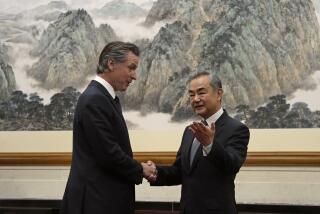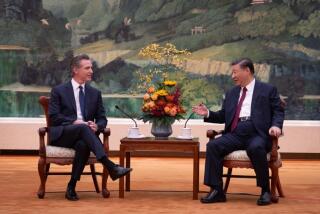Jiang Should Reread Mao’s Red Book
- Share via
Do you think communism has a future? I asked the waiter at the Beverly Hilton as he poured the wine for our obligatory toast to Jiang Zemin. No comment, he said, as the band struck up the Chinese national anthem that exhorts all of us who don’t want to be slaves to “rise up.”
The revolutionary tune was rendered splendidly by the USC Trojan Marching Band, and Jiang beamed his trademark smile. It’s probably only a matter of time until the assembled CEOs and other dignitaries in the audience, most of whom do business with China, learn the words.
OK. That’s how the world turns. It was meant to be that the Los Angeles elite would meet the leader of Red China at the end of his U.S. visit. As Gov. Pete Wilson pointed out in his fawning introduction, China will soon be our main trading partner and already is the repository of massive U.S. investment. Wilson, who has made a name as California’s chief immigrant-basher, even raved about the substantial contribution Chinese immigrants have made to his state, so there really is no understating the power of a beckoning market. It isn’t often you get to smile at 1.2 billion customers.
Power is what counts, and as the leader of a country whose economy is growing at 12% a year, Jiang has the power, and the forlorn pickets outside the hotel complaining about Tibet, human rights and other lost causes do not.
Not that I’m against trade, but do we have to grovel so completely now that Chinese communism is in fashion? Hard to recall that there was once a time when a teacher lost her job for signing a petition saying that Red China should be admitted to the U.N. Even more radical was to advocate that the U.S. recognize Beijing rather than Taipei as the capital of China.
And of course it was illegal to go to China as a tourist until Richard Nixon decided two decades after the communist revolution that they were the good communists. Nixon felt it was in our national interest to cozy up to China because it would help us beat communism in Vietnam. The smaller the communist country, the bigger the danger, which is why Cuba remains a threat.
“Who lost China?” was the big issue back in the 1950s, when Republicans like Nixon claimed that the Democrats had sold out to the Chinese communists. For decades, American politics were traumatized by that charge. Visions of the ChiComs, their hordes sweeping through Asia and on to San Diego, fueled the Cold War and cost the lives of millions of Asians as well as an appreciable number of Americans.
Well, lo and behold, China under communism is not lost to the West. It has been found, by the likes of the Jiang luncheon cosponsors Boeing, Arco, Mattel and Times Mirror. A dozen multinational corporations blatantly seized the occasion to sell their latest wares. Both Ford and General Motors were well represented.
Universal Studios recognized “the need to blend the best of our creativity and entertainment with respect for and understanding of cultural heritage.” No Tibet movie from them. Rupert Murdoch’s News Corp. proclaimed in the program that it “is building an unparalleled global distribution platform and developing quality content with lasting profitable brand names”--a statement that undoubtedly reads better in the original Chinese.
For those troubled by the issues raised by the pickets outside, it was reassuring to read that the “Bank of America has the utmost confidence in China’s economic reforms and its future.” Boeing, self-described as “China’s premier aviation partner,” made a $3-billion sale to Jiang last week.
For his part, Jiang remarked that this was his third visit to Los Angeles and that he has been impressed with the West ever since he first passed through on his way to Tijuana. It seems that the special economic zones of Mexico, providing a docile labor force for U.S. companies, suggested just the model he was seeking to emulate.
Jiang summarized the trip with the words, “The two sides stress we should further strengthen trade and investment.”
Power speaks a common language--unctuous, arrogant and always self-congratulatory. Which is precisely why we need those noisy pickets pleading their varied causes on the streets outside. Somebody has to remind Jiang, Wilson and all of those CEOs of the habits of a free people daring to speak truth to power. That was, after all, the promise of the Chinese revolution, as Mao once wrote:
“The only way to settle controversial issues among the people is by the democratic method, the method of discussion, of criticism, of persuasion and education, and not by the method of coercion or repression.” Jiang should read Mao’s “Little Red Book” again.
More to Read
Sign up for Essential California
The most important California stories and recommendations in your inbox every morning.
You may occasionally receive promotional content from the Los Angeles Times.













